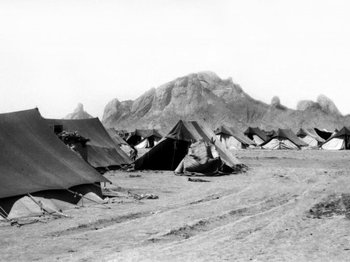For World Humanitarian Day 2015, we asked two humanitarians, one at the beginning of their career and one with years of experience, what motivated them about humanitarian action. Here Maurice Herson looks back on his long career in humanitarianism; read if new starter Henry Ashcroft sees aid work differently in his blog.
We often talk of the changing nature of humanitarian situations, yet many crises were just as simple and as complex back in the mid-1980s –when I was first involved in this line of work – as they are now. What has changed, though, is the nature of working as a humanitarian, certainly for an expatriate humanitarian worker.
I was an amateur doing a serious job... I invented my own methods and what we’d call ‘standards’ nowadays.
It all started when I found myself close to an informal and unassisted camp of Ethiopian refugees in eastern Sudan where I was working as a teacher and just went to help out. I then offered myself to an agency working in Darfur and was flown out with nary any formality. I was an amateur doing a serious job and, fortunately, I think I rose to the challenge, with little structure but my own wits to teach me how it should be done. I invented my own methods and what we’d call ‘standards’ nowadays. I created systems, by and large, and found that what we now call ‘accountability’ and ‘beneficiary involvement’ was the natural way to proceed. I had occasional contact with expatriate colleagues but my driving forces were the desire to get my local colleagues to do it right (as I saw it) and my own goodwill.
When I finished that job, my debrief was even more cursory than my induction. In those days there was no career structure and no formal qualifications that I was aware of. I seemed to be considered a hardened and experienced worker by the time I took my second and even a third contract, no longer the green amateur, purely by virtue of having done the job.
I don’t think I’m confusing my personal history with external reality when I say I witnessed over the years the coming of much-needed standards and codes, training and management systems, that meaning of professionalism. But it dragged in its wake the managerialism and professional careerism that is now the familiar landscape of the big agencies. How many times did I say, as I was recruiting staff, that more than goodwill is necessary!
Personally I have no major regrets about the work I’ve done – except that I should maybe have resisted the climb up the hierarchy and instead stayed closer to the place where I could have continued being something of an amateur. Maybe this is similar to the place where many of the local organisations are now, drawn to humanitarianism to help, rather than for the purpose of having a job. I feel I see the local organisations being drawn along – willingly, or maybe under duress from donors and others – to behave like system-ridden expat organisations, where doing the thing right is, it seems, as important as doing the right thing.

Photo credit: Flickr/Frank Keillor
This is of course unfair, and I hold my hands up to being jaded and somewhat cynical. I also admit to having myself been carried along in being instrumental in this process of professionalising the sector. I hope that we are now nevertheless in a better place to respond to humanitarian needs than we were when I started out hoping to do good, and never imagining where it would lead me nor how the world of humanitarian needs and responses would develop.
I feel I see the local organisations being drawn along to behave like system-ridden expat organisations, where doing the thing right is, it seems, as important as doing the right thing.
When I look back at my motives in 1984, they were outrage, a sense of injustice, concern, pity and shame at what I saw in that camp. I think those are many of the same motives that continued to drive me till I slipped sideways out of being a humanitarian worker into editing a magazine that deals with those same concerns and people who are in need of humanitarian protection and assistance. For all our failings and the criticisms that we ourselves and others make of humanitarian work, all in all I’m proud that we collectively care enough to go on trying.